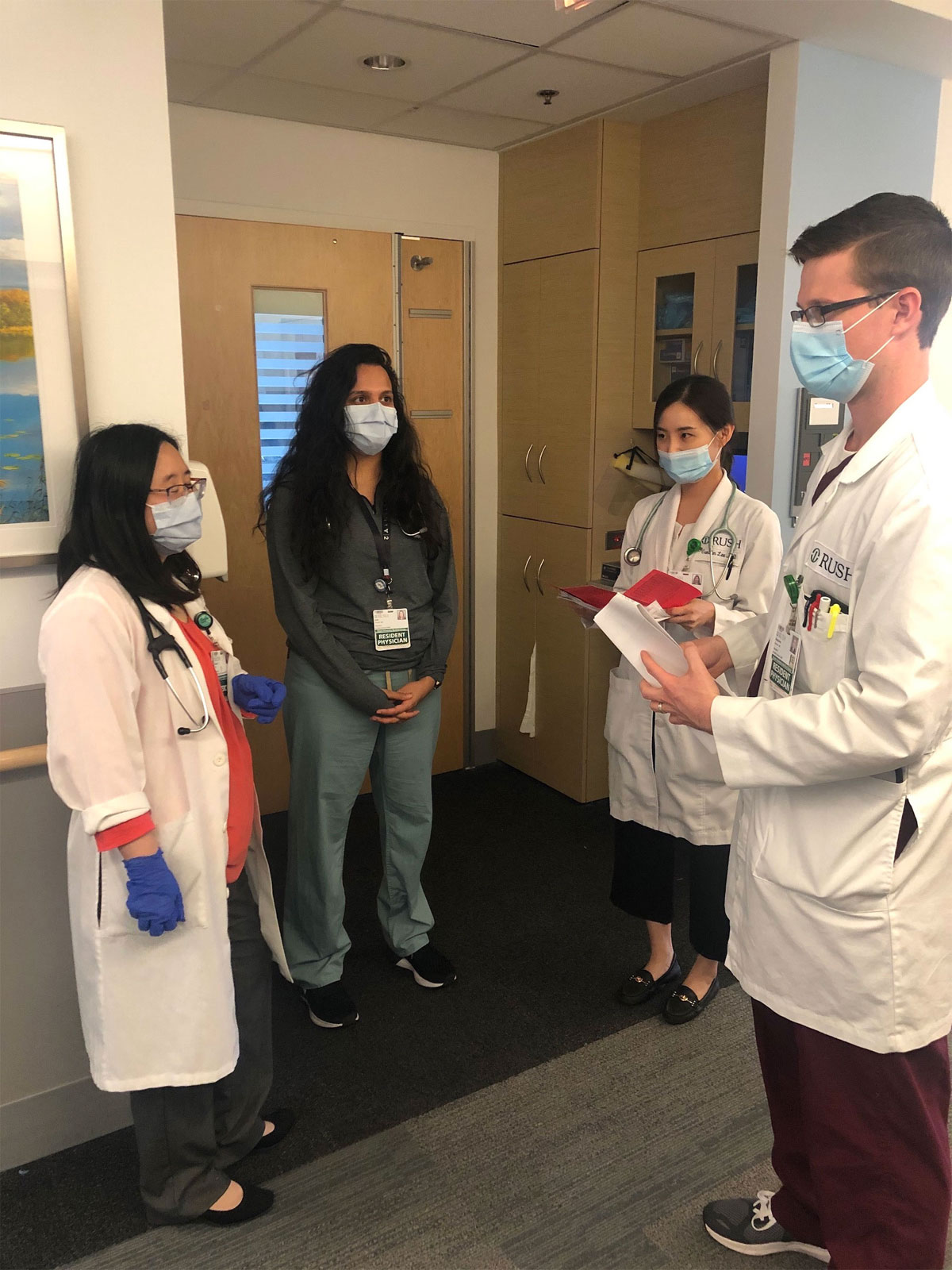The Fellowship Program Curriculum
The clinical curriculum of the combined RUSH University Medical Center (RUMC) and Cook County Health (CCH) Infectious Diseases Fellowship Program encompasses RUMC, John H. Stroger, Jr. Hospital of Cook County, and the Ruth Rothstein CORE Center. The diversity of exemplary clinical experience is unparalleled due to the incorporation of a large tertiary-care academic hospital and referral center, Chicago’s primary safety-net hospital system, and a groundbreaking comprehensive HIV care center. Clinical experiences are coupled with extensive extra-clinical opportunities for mentorship within the full breadth of the Infectious Diseases discipline.
Fellows receive rigorous training in Infectious Diseases within a highly supportive atmosphere geared towards success in any career path, including academic medicine, private practice, or public health. Fellows also experience a level of flexibility that is unique among fellowship programs due to the large number of fellows (5) per year. RUMC has an emphasis on trainee wellness, and fellows will find they have the time for self-enrichment outside of their core clinical responsibilities.
Clinical Curriculum Overview
First year fellows spend approximately 28 weeks on inpatient services, allowing approximately 20 weeks for outpatient rotations, research, study, and electives; with 4 weeks of vacation.
Second year fellows spend approximately 18 weeks on inpatient services, leaving approximately 30 weeks for outpatient rotations, research, study, and electives; with 4 weeks of vacation.
All rotations are in 2-week blocks throughout the year. One first year and one second year fellow share an adult HIV/primary care half day continuity clinic at the CORE Center.
Mentorship and Research
 Many opportunities for mentorship and research are available in the clinical, translational, and basic sciences at both RUMC and CCH. RUMC/CCH is a participating site of the AIDS Clinical Trials Group and is one of eleven CDC Prevention Epicenters in the United States. Fellows have an option for a third year research fellowship through the CDC Prevention Epicenters program. RUMC is also a participant in the Institute for Translational Medicine, which awards substantial grants through its TL1 Trainee Awards.
Many opportunities for mentorship and research are available in the clinical, translational, and basic sciences at both RUMC and CCH. RUMC/CCH is a participating site of the AIDS Clinical Trials Group and is one of eleven CDC Prevention Epicenters in the United States. Fellows have an option for a third year research fellowship through the CDC Prevention Epicenters program. RUMC is also a participant in the Institute for Translational Medicine, which awards substantial grants through its TL1 Trainee Awards.
Individual Components of the Core Curriculum
Inpatient Service Rotations
- RUMC General ID Consult Service – A consulting team consisting of the ID Attending, Fellow, Medicine Residents, Physician Assistants, ID Pharmacy Residents, and Medical Students.

- RUMC Transplant/Malignant Hematology Service – A specialized service with a Fellow/Attending team caring for solid organ transplant, and hematologic malignancy/bone marrow transplant. This experience allows exclusive one-on-one time between the fellow and ID faculty.
- Stroger Hospital General ID Consult Services – Two services that share consult duties equally at Stroger Hospital, a large safety net hospital for the city of Chicago and Cook County. Each team consists of an Attending, Fellow, Residents, Physician Assistants, Medical Students, and often Pharmacy Residents.
- Stroger Hospital Inpatient HIV Service – The Fellow provides rounding expertise and bedside teaching on this mainly Attending/Resident-run service, caring for patients with HIV/AIDS who are admitted to the hospital, often with advanced problems unique to this patient population.
Outpatient Service Rotations
- CORE Center HIV/Primary Care Continuity Clinic - Once a week, fellows in collaboration with an ID attending, provide care for persons living with HIV including HIV treatment, primary medical care, and comprehensive support to promote healthy living. The clinic is based in the Ruth M. Rothstein CORE Center, one of the largest HIV/AIDS clinics in the U.S.
- RUMC General Infectious Diseases Clinic - In this clinic, fellows have the opportunity to manage patients with infectious diseases in an ambulatory care setting including medical and surgical hospital follow-ups, pre-transplant screenings, and new evaluation of patients with communicable diseases.
- CORE Infectious Disease Clinics - Fellows rotate through a number of different ID clinics at CORE Center including General ID Clinic, Hepatitis Clinic, and Public Health STD Clinic. Fellows are given the opportunity to be involved in treating HCV, common and uncommon STIs, and tropical infectious diseases.
Didactics
- Infectious Diseases Grand Rounds Weekly Case Conference
- Conference Video
- Anisakiasis
- Capnocytophaga Bacteremia
- Example Case Powerpoints
- Conference Video
- Clinical Microbiology Weekly Rounds
- Fellow Board Review Lecture Series with RUMC/CCH Faculty
- CORE Center Lecture Series
- Research Conferences / ID Journal Club Monthly
- Journal Club
- Infection Control Lunch & Learn Sessions
- IDWeek as a 2nd year Fellow (with option of Andriole Board Review Course)
- RUMC Infectious Diseases Board Review Course (published by CME Info)
- SHEA Fellows Hospital Epidemiology/Infection Control/Antimicrobial Stewardship Primer Course
- IDSA Antimicrobial Stewardship Curriculum
Elective Service Opportunities
- Clinical Microbiology (RUMC)
- Antimicrobial Stewardship (RUMC/CCH)
- Public Health (in partnership with the Chicago Department of Public Health)
- Tropical Infectious Diseases (RUMC and affiliated international sites)
- Pediatric Infectious Diseases (RUMC)
- Incarceration Infectious Diseases (CCH/Cermak Cook County Jail)
- PrEP Clinic (CCH/RUMC)
